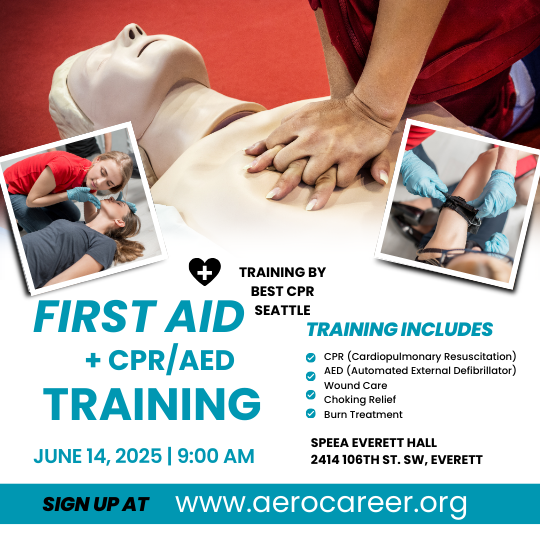
First Aid + CPR/AED
BestCPRSeattle offers highly engaging and practical "hands-on" training led by BESTCPRUSA certified American Heart Association instructors. Their goal is to ensure each participant feels comfortable learning life-saving skills in a highly engaging, fast-paced, comprehensive training session. Nationally recognized course completion cards are issued immediately via email and are valid for 2 years.

2025 Networking Night event
Join us as we showcase ACE programming while you connect, collaborate and celebrate with industry colleagues!
Meet fellow mentors, mentees, aerospace professionals and new hires in the aerospace industry. This is a great event to forge connections that can last your entire career while enjoying some network activities.
There will be Wind Tunnel demos, 3D Printer exhibition, VR (Virtual Realilty) station.
RSVP today to guarantee your spot: https://www.research.net/r/R3P7KZQ.
We look forward to seeing you!

The Same but Different: Lifting Others and Supporting the Marginalized
Every human brain has something called in-group bias, which influences how we react to people we consider different from ourselves. In this session we will explore some of the history of the LGBTQ+ community and the significant role bias has played in that history. Most important, we will discuss how to break through our biases, foster equity, and help all people feel included.
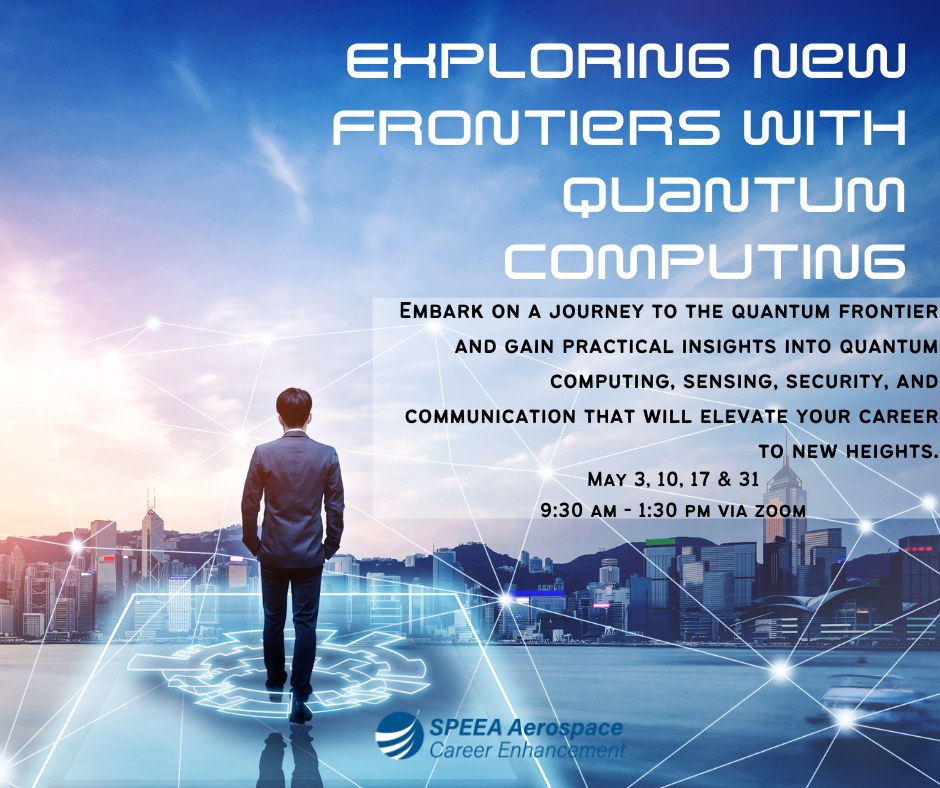
Exploring New Frontiers with Quantum Computing - Day 4
Embark on a journey to the quantum frontier and discover how groundbreaking technologies are reshaping the future of aerospace. Through hands-on activities with real-world quantum tools, you'll gain practical insights into quantum computing, sensing, security, and communication that will elevate your career to new heights.
This course will occur over 4 nonconsecutive Saturdays in the month of May: 3rd, 10th, 17th, & 31st.
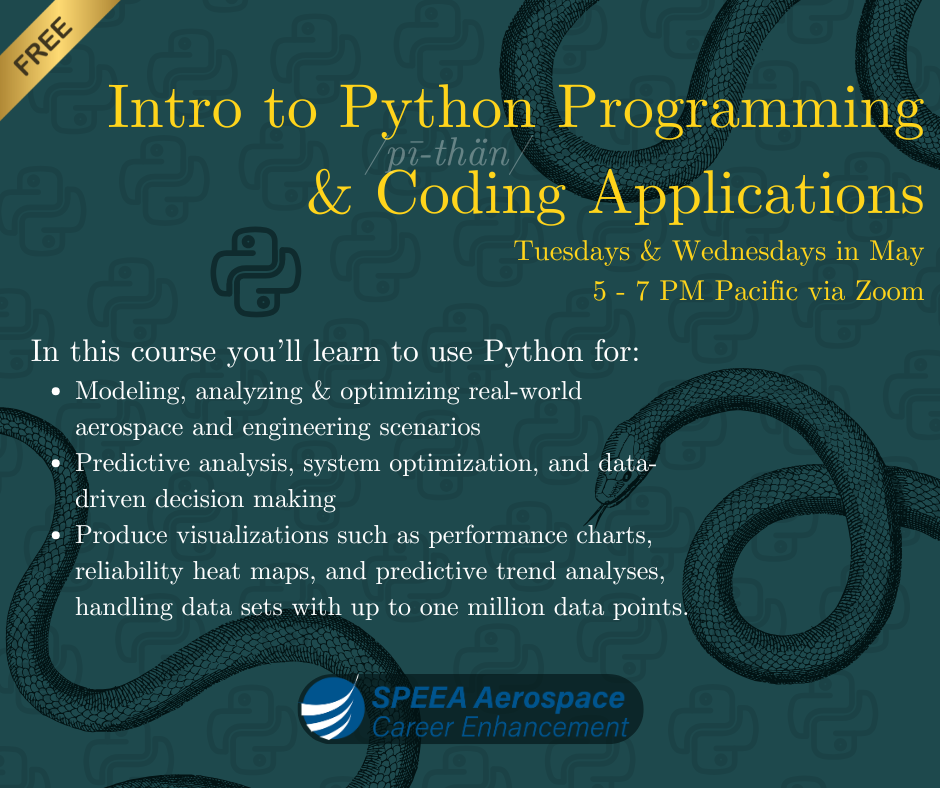
Intro to Python Programming & Coding Applications - Day 8 of 8
Introductory and advanced participants will be provided with essential mathematical concepts and Python programming frameworks critical for modeling, analyzing, and optimizing real-world aerospace and engineering scenarios. This course explores predictive analytics, system optimization, and data-driven decision-making through state machines. Students will directly apply these concepts to scenarios relevant to aerospace roles, such as autonomous drone navigation using LiDAR, radar, and object recognition algorithms, as well as advanced Identification Friend or Foe (IFF) transponder systems.
Participants will utilize Python and various open source data analytics tools to produce visualizations such as performance charts, reliability heat maps, and predictive trend analyses, handling large-scale datasets of up to one million data points (100 x 10,000). The course is structured to accommodate varied skill levels, with content suitable for both beginners and experienced students, ensuring practical applicability through case studies and hands-on projects relevant to diverse engineering roles across a myriad of fields. Because of the complex nature of this class, there will be two co-instructors and instructors will offer one hour of “office hours” per lesson.

Intro to Python Programming & Coding Applications - Day 7 of 8
Introductory and advanced participants will be provided with essential mathematical concepts and Python programming frameworks critical for modeling, analyzing, and optimizing real-world aerospace and engineering scenarios. This course explores predictive analytics, system optimization, and data-driven decision-making through state machines. Students will directly apply these concepts to scenarios relevant to aerospace roles, such as autonomous drone navigation using LiDAR, radar, and object recognition algorithms, as well as advanced Identification Friend or Foe (IFF) transponder systems.
Participants will utilize Python and various open source data analytics tools to produce visualizations such as performance charts, reliability heat maps, and predictive trend analyses, handling large-scale datasets of up to one million data points (100 x 10,000). The course is structured to accommodate varied skill levels, with content suitable for both beginners and experienced students, ensuring practical applicability through case studies and hands-on projects relevant to diverse engineering roles across a myriad of fields. Because of the complex nature of this class, there will be two co-instructors and instructors will offer one hour of “office hours” per lesson.

Intro to Python Programming & Coding Applications - Day 6 of 8
Introductory and advanced participants will be provided with essential mathematical concepts and Python programming frameworks critical for modeling, analyzing, and optimizing real-world aerospace and engineering scenarios. This course explores predictive analytics, system optimization, and data-driven decision-making through state machines. Students will directly apply these concepts to scenarios relevant to aerospace roles, such as autonomous drone navigation using LiDAR, radar, and object recognition algorithms, as well as advanced Identification Friend or Foe (IFF) transponder systems.
Participants will utilize Python and various open source data analytics tools to produce visualizations such as performance charts, reliability heat maps, and predictive trend analyses, handling large-scale datasets of up to one million data points (100 x 10,000). The course is structured to accommodate varied skill levels, with content suitable for both beginners and experienced students, ensuring practical applicability through case studies and hands-on projects relevant to diverse engineering roles across a myriad of fields. Because of the complex nature of this class, there will be two co-instructors and instructors will offer one hour of “office hours” per lesson.

Intro to Python Programming & Coding Applications - Day 5 of 8
Introductory and advanced participants will be provided with essential mathematical concepts and Python programming frameworks critical for modeling, analyzing, and optimizing real-world aerospace and engineering scenarios. This course explores predictive analytics, system optimization, and data-driven decision-making through state machines. Students will directly apply these concepts to scenarios relevant to aerospace roles, such as autonomous drone navigation using LiDAR, radar, and object recognition algorithms, as well as advanced Identification Friend or Foe (IFF) transponder systems.
Participants will utilize Python and various open source data analytics tools to produce visualizations such as performance charts, reliability heat maps, and predictive trend analyses, handling large-scale datasets of up to one million data points (100 x 10,000). The course is structured to accommodate varied skill levels, with content suitable for both beginners and experienced students, ensuring practical applicability through case studies and hands-on projects relevant to diverse engineering roles across a myriad of fields. Because of the complex nature of this class, there will be two co-instructors and instructors will offer one hour of “office hours” per lesson.

Exploring New Frontiers with Quantum Computing - Day 3
Embark on a journey to the quantum frontier and discover how groundbreaking technologies are reshaping the future of aerospace. Through hands-on activities with real-world quantum tools, you'll gain practical insights into quantum computing, sensing, security, and communication that will elevate your career to new heights.
This course will occur over 4 nonconsecutive Saturdays in the month of May: 3rd, 10th, 17th, & 31st.

First Aid + CPR/AED
BestCPRSeattle offers highly engaging and practical "hands-on" training led by BESTCPRUSA certified American Heart Association instructors. Their goal is to ensure each participant feels comfortable learning life-saving skills in a highly engaging, fast-paced, comprehensive training session. Nationally recognized course completion cards are issued immediately via email and are valid for 2 years.

Composites 102: Wet Layup & Destructive Testing - Day 3
Participants will learn:
Participants will learn basic composites manufacturing skills at an introductory level. Including 30 common basic composites terms, basic safety procedures & practices, and the basics of wet layup & vacuum bag techniques. Students will also be exposed to basic, simple materials such as fibers, resins, consumables, as well as engineering analysis tools and techniques. After building their own composite laminates, students will have the chance to test them through destructive means. To participate in Wet Layup & Destructive Testing #2 on May 10, 2025, students must attend Wet Layup & Destructive Testing #1 on Thursday, May 8, 2025.
The first session will go over Composite basics and lab safety.
Over the 3-part course, students will also learn how to:
o Cut the fabric at precisely the correct size and orientation.
o Mix the resin, including precise quantity, ratios, and mixing times.
o Apply resin to fabric without distorting / unravelling the fabric.
o Place the fabric accurately, placement and orientation.
o Apply release films, breathers, peel plies.
o Apply vacuum bags, sealants and vacuum ports.
o Keep proper records.

Intro to Python Programming & Coding Applications - Day 4 of 8
Introductory and advanced participants will be provided with essential mathematical concepts and Python programming frameworks critical for modeling, analyzing, and optimizing real-world aerospace and engineering scenarios. This course explores predictive analytics, system optimization, and data-driven decision-making through state machines. Students will directly apply these concepts to scenarios relevant to aerospace roles, such as autonomous drone navigation using LiDAR, radar, and object recognition algorithms, as well as advanced Identification Friend or Foe (IFF) transponder systems.
Participants will utilize Python and various open source data analytics tools to produce visualizations such as performance charts, reliability heat maps, and predictive trend analyses, handling large-scale datasets of up to one million data points (100 x 10,000). The course is structured to accommodate varied skill levels, with content suitable for both beginners and experienced students, ensuring practical applicability through case studies and hands-on projects relevant to diverse engineering roles across a myriad of fields. Because of the complex nature of this class, there will be two co-instructors and instructors will offer one hour of “office hours” per lesson.

Intro to Python Programming & Coding Applications - Day 3 of 8
Introductory and advanced participants will be provided with essential mathematical concepts and Python programming frameworks critical for modeling, analyzing, and optimizing real-world aerospace and engineering scenarios. This course explores predictive analytics, system optimization, and data-driven decision-making through state machines. Students will directly apply these concepts to scenarios relevant to aerospace roles, such as autonomous drone navigation using LiDAR, radar, and object recognition algorithms, as well as advanced Identification Friend or Foe (IFF) transponder systems.
Participants will utilize Python and various open source data analytics tools to produce visualizations such as performance charts, reliability heat maps, and predictive trend analyses, handling large-scale datasets of up to one million data points (100 x 10,000). The course is structured to accommodate varied skill levels, with content suitable for both beginners and experienced students, ensuring practical applicability through case studies and hands-on projects relevant to diverse engineering roles across a myriad of fields. Because of the complex nature of this class, there will be two co-instructors and instructors will offer one hour of “office hours” per lesson.

Exploring New Frontiers with Quantum Computing - Day 2
Embark on a journey to the quantum frontier and discover how groundbreaking technologies are reshaping the future of aerospace. Through hands-on activities with real-world quantum tools, you'll gain practical insights into quantum computing, sensing, security, and communication that will elevate your career to new heights.
This course will occur over 4 nonconsecutive Saturdays in the month of May: 3rd, 10th, 17th, & 31st.

Composites 102: Wet Layup & Destructive Testing - Day 2
Participants will learn:
Participants will learn basic composites manufacturing skills at an introductory level. Including 30 common basic composites terms, basic safety procedures & practices, and the basics of wet layup & vacuum bag techniques. Students will also be exposed to basic, simple materials such as fibers, resins, consumables, as well as engineering analysis tools and techniques. After building their own composite laminates, students will have the chance to test them through destructive means. To participate in Wet Layup & Destructive Testing #2 on May 10, 2025, students must attend Wet Layup & Destructive Testing #1 on Thursday, May 8, 2025.
The first session will go over Composite basics and lab safety.
Over the 3-part course, students will also learn how to:
o Cut the fabric at precisely the correct size and orientation.
o Mix the resin, including precise quantity, ratios, and mixing times.
o Apply resin to fabric without distorting / unravelling the fabric.
o Place the fabric accurately, placement and orientation.
o Apply release films, breathers, peel plies.
o Apply vacuum bags, sealants and vacuum ports.
o Keep proper records.

Composites 102: Wet Layup & Destructive Testing - Day 1
Participants will learn:
Participants will learn basic composites manufacturing skills at an introductory level. Including 30 common basic composites terms, basic safety procedures & practices, and the basics of wet layup & vacuum bag techniques. Students will also be exposed to basic, simple materials such as fibers, resins, consumables, as well as engineering analysis tools and techniques. After building their own composite laminates, students will have the chance to test them through destructive means. To participate in Wet Layup & Destructive Testing #2 on May 10, 2025, students must attend Wet Layup & Destructive Testing #1 on Thursday, May 8, 2025.
The first session will go over Composite basics and lab safety.
Over the 3-part course, students will also learn how to:
o Cut the fabric at precisely the correct size and orientation.
o Mix the resin, including precise quantity, ratios, and mixing times.
o Apply resin to fabric without distorting / unravelling the fabric.
o Place the fabric accurately, placement and orientation.
o Apply release films, breathers, peel plies.
o Apply vacuum bags, sealants and vacuum ports.
o Keep proper records.

Intro to Python Programming & Coding Applications - Day 2 of 8
Introductory and advanced participants will be provided with essential mathematical concepts and Python programming frameworks critical for modeling, analyzing, and optimizing real-world aerospace and engineering scenarios. This course explores predictive analytics, system optimization, and data-driven decision-making through state machines. Students will directly apply these concepts to scenarios relevant to aerospace roles, such as autonomous drone navigation using LiDAR, radar, and object recognition algorithms, as well as advanced Identification Friend or Foe (IFF) transponder systems.
Participants will utilize Python and various open source data analytics tools to produce visualizations such as performance charts, reliability heat maps, and predictive trend analyses, handling large-scale datasets of up to one million data points (100 x 10,000). The course is structured to accommodate varied skill levels, with content suitable for both beginners and experienced students, ensuring practical applicability through case studies and hands-on projects relevant to diverse engineering roles across a myriad of fields. Because of the complex nature of this class, there will be two co-instructors and instructors will offer one hour of “office hours” per lesson.

Intro to Python Programming & Coding Applications - Day 1 of 8
Introductory and advanced participants will be provided with essential mathematical concepts and Python programming frameworks critical for modeling, analyzing, and optimizing real-world aerospace and engineering scenarios. This course explores predictive analytics, system optimization, and data-driven decision-making through state machines. Students will directly apply these concepts to scenarios relevant to aerospace roles, such as autonomous drone navigation using LiDAR, radar, and object recognition algorithms, as well as advanced Identification Friend or Foe (IFF) transponder systems.
Participants will utilize Python and various open source data analytics tools to produce visualizations such as performance charts, reliability heat maps, and predictive trend analyses, handling large-scale datasets of up to one million data points (100 x 10,000). The course is structured to accommodate varied skill levels, with content suitable for both beginners and experienced students, ensuring practical applicability through case studies and hands-on projects relevant to diverse engineering roles across a myriad of fields. Because of the complex nature of this class, there will be two co-instructors and instructors will offer one hour of “office hours” per lesson.

Exploring New Frontiers with Quantum Computing - Day 1
Embark on a journey to the quantum frontier and discover how groundbreaking technologies are reshaping the future of aerospace. Through hands-on activities with real-world quantum tools, you'll gain practical insights into quantum computing, sensing, security, and communication that will elevate your career to new heights.
This course will occur over 4 nonconsecutive Saturdays in the month of May: 3rd, 10th, 17th, & 31st.
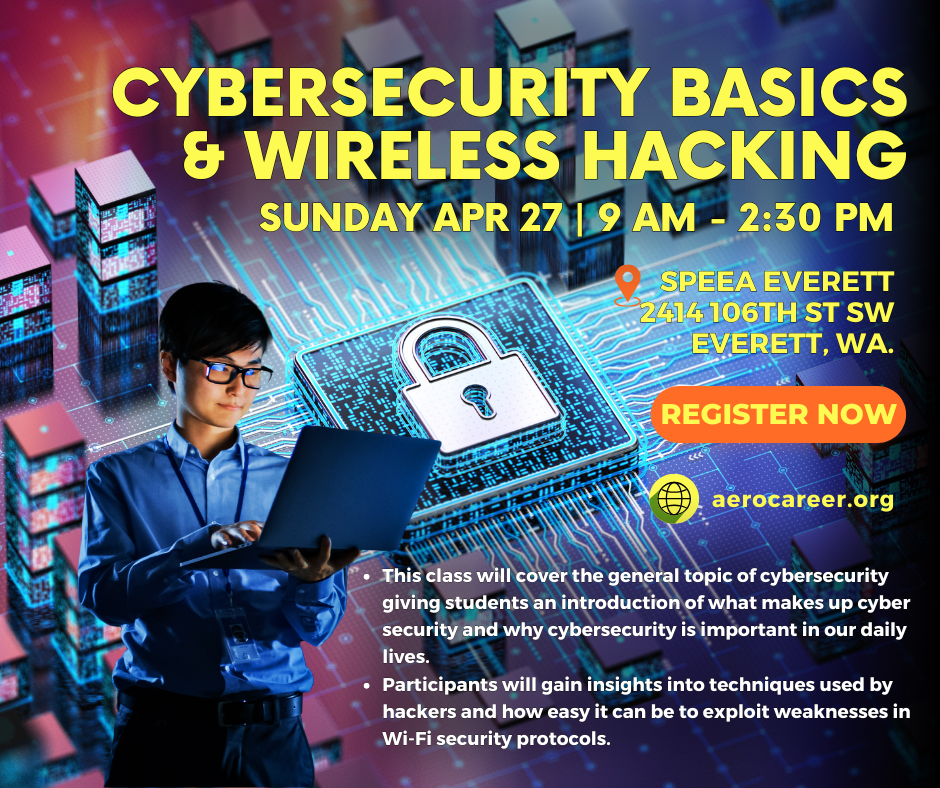
Cybersecurity Basic and Wireless Hacking
This class will cover the general topic of cybersecurity giving students an introduction of what makes up cyber security and why cybersecurity is important in our daily lives by demystifying the concept of cybersecurity, explaining it as the practice of protecting digital systems, networks, and data from unauthorized access, cyber attacks, and other potential threats. Participants will gain insight into the importance of cybersecurity in safeguarding sensitive information, preserving privacy, and maintaining the integrity of digital infrastructure.
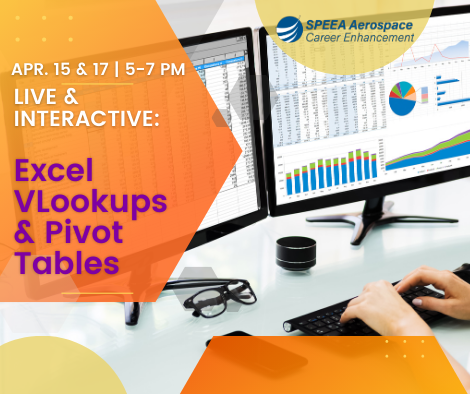
Live & Interactive Excel: VLookups & Pivot Tables - Day 2
Learning Objectives: • Enable participants to recognize a wide range of problems/situations that can be solved with the combination of IF functions, VLookup functions, Pivot Tables and Pivot Charts • Enable participants to creatively apply these concepts to their unique work statements through hands-on practice and coaching Training Scope: This course is limited to Lookup and Pivot Table tools and functions within the basic Excel program. This course DOES NOT cover, PowerPivot, Power Query, VBA, Python, SQL, MATLAB/Simulink, etc.

Live & Interactive Excel: VLookups & Pivot Tables - Day 1
Learning Objectives: • Enable participants to recognize a wide range of problems/situations that can be solved with the combination of IF functions, VLookup functions, Pivot Tables and Pivot Charts • Enable participants to creatively apply these concepts to their unique work statements through hands-on practice and coaching Training Scope: This course is limited to Lookup and Pivot Table tools and functions within the basic Excel program. This course DOES NOT cover, PowerPivot, Power Query, VBA, Python, SQL, MATLAB/Simulink, etc.
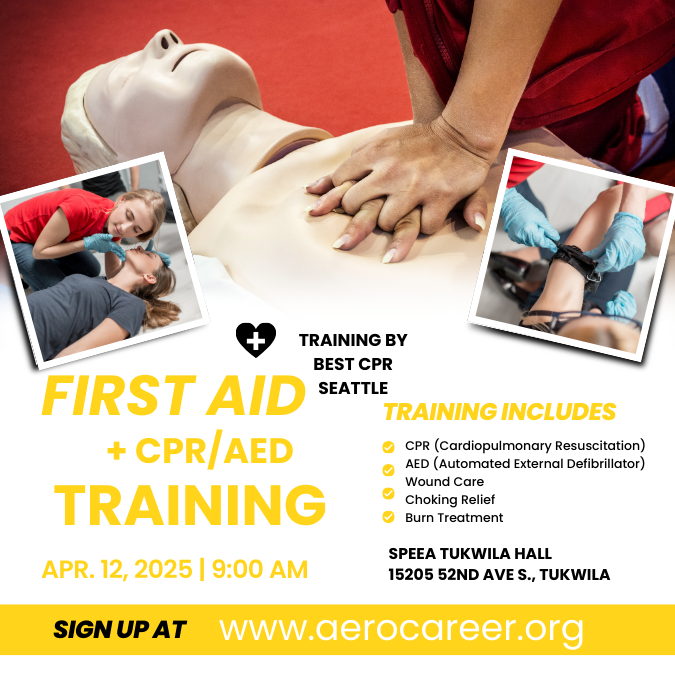
First Aid + CPR/AED
BestCPRSeattle offers highly engaging and practical "hands-on" training led by BESTCPRUSA certified American Heart Association instructors. Their goal is to ensure each participant feels comfortable learning life-saving skills in a highly engaging, fast-paced, comprehensive training session. Nationally recognized course completion cards are issued immediately via email and are valid for 2 years.
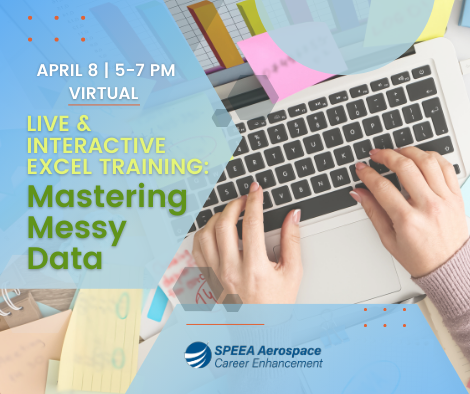
Live & Interactive Excel Training: Mastering Messy Data
OBJECTIVES
Excel is powerful software that has become an essential tool for engineers throughout the aerospace industry. It is frequently used for data analysis and complexity management. This class is focused on several of the most useful features and functions within the software and their practical application in engineering contexts. The emphasis is on common challenges associated with imperfect or “messy” data and how to efficiently address them. The class is presented in a hands-on format where students will work though exercises with an instructor. No prior Excel knowledge is required; this class is designed for Beginner-to-Intermediate Excel users. Students will come away from the class with specific skills that they can immediately apply on-the-job.
Learning Objectives:
Familiarization with a range of tools, functions, and features within Excel with emphasis on their practical application towards fixing, building, and enhancing data sets to enable analysis.DATE: March 4, 2025
This training WILL NOT be recorded.
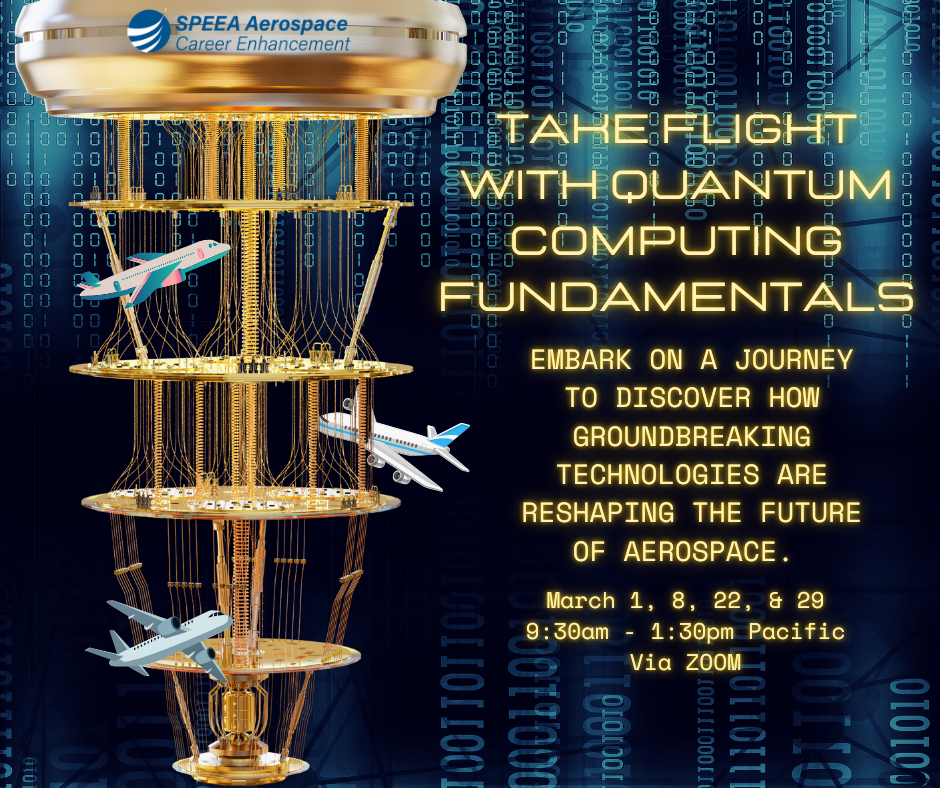
Take Flight with Quantum Computing Fundamentals - Day 4
Embark on a journey to the quantum frontier and discover how groundbreaking technologies are reshaping the future of aerospace. Through hands-on activities with real-world quantum tools, you'll gain practical insights into quantum computing, sensing, security, and communication that will elevate your career to new heights.

Advanced VR Development in Unreal Engine Class 6: Building an Interactive Menu in VR
Menus are very common and can have a significant effect on the gaming experience. A buggy or counter-intuitive menu can be very frustrating for players. It is important that we know how to build clean, intuitive user interfaces that work well. In this class, students will learn how to make an interactive menu in virtual reality (VR). Students will be introduced to the Unreal Motion Graphics (UMG) user interface, where we will create an in-game menu with a simple interface. We will then learn how to place our menu in 3D world space and interact with our menu in VR. By the end of the class, students will create a custom menu and place it in their VR environment. They will be able to affect changes to objects in the environment, simply by pressing a button on the menu, e.g. highlighting certain object, make other object disappear, make some object interactive.
This “Advanced” course will focus on making custom interactions in VR, so students will be able to interact with hand tools, buttons, and levers, in addition to creating interactive VR menus. The course will require a lot of coding, so students should have a solid understanding of coding principles before taking the “Advanced” course. If a student does not have much experience with coding, it is highly recommend they take a Python development course beforehand.
HYBRID 6-part series, Tuesdays from 5:30-7:30pm starting Febraury 4th

Take Flight with Quantum Computing Fundamentals - Day 3
Embark on a journey to the quantum frontier and discover how groundbreaking technologies are reshaping the future of aerospace. Through hands-on activities with real-world quantum tools, you'll gain practical insights into quantum computing, sensing, security, and communication that will elevate your career to new heights.

Advanced VR Development in Unreal Engine Class 5: Interacting with Buttons & Levers in VR
Sometimes we are required to interact with objects that we cannot pick up, and who have very specific motions, e.g. a button is pressed down, a lever rotates, and a drawer is pulled out. How do we make those virtual interactions intuitive and realistic? In this class, students will learn how to interact with a variety of objects that only move on specific paths. We will cover how to lock the player's virtual hand to the object, and how to set thresholds to release the object when the player pulls their hand away. By the end of the class, students will be able to press a button, pull a lever up and down, and be able to open and close a desk drawer.
This “Advanced” course will focus on making custom interactions in VR, so students will be able to interact with hand tools, buttons, and levers, in addition to creating interactive VR menus. The course will require a lot of coding, so students should have a solid understanding of coding principles before taking the “Advanced” course. If a student does not have much experience with coding, it is highly recommend they take a Python development course beforehand.
HYBRID 6-part series, Tuesdays from 5:30-7:30pm starting Febraury 4th
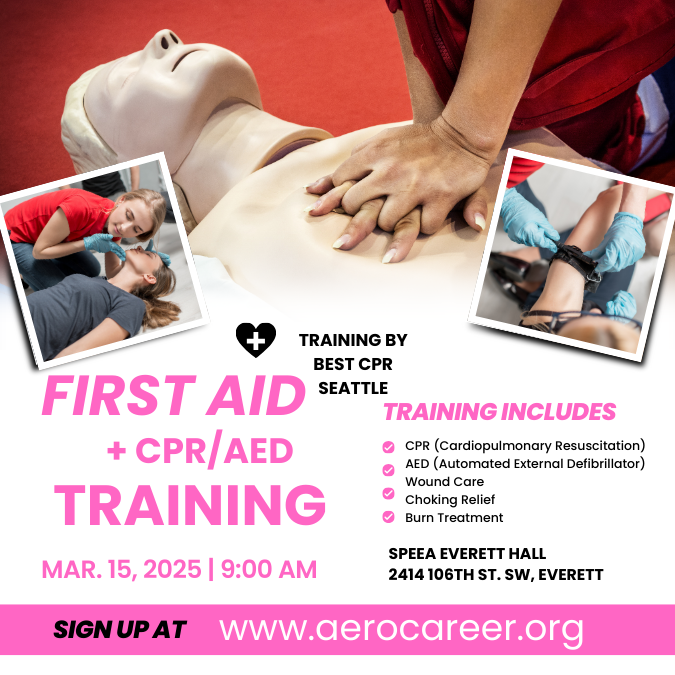
First Aid + CPR/AED
BestCPRSeattle offers highly engaging and practical "hands-on" training led by BESTCPRUSA certified American Heart Association instructors. Their goal is to ensure each participant feels comfortable learning life-saving skills in a highly engaging, fast-paced, comprehensive training session. Nationally recognized course completion cards are issued immediately via email and are valid for 2 years.

Advanced VR Development in Unreal Engine Class 4: Using Hand Tools in VR
Think of how you hold a hammer and how that is different than how you hold a cup of coffee. The same is true in virtual reality (VR). If you pick up a drill and the drill is facing the wrong way, that would be useless, unnatural, and break the sense of immersion. How you pick up an object in VR is important. In this class, students will learn how to place an object in the hand in a specific orientation and location. We will explore the skeletal mesh editing system and create custom hand poses. We will learn how to trigger specific hand poses when specific objects are picked up, to make it look like our virtual hand is actually holding the virtual object. By the end of this class, students will be able to pick up several uniquely shaped hand tools and snap them into the correct orientation when they are picked up.
This “Advanced” course will focus on making custom interactions in VR, so students will be able to interact with hand tools, buttons, and levers, in addition to creating interactive VR menus. The course will require a lot of coding, so students should have a solid understanding of coding principles before taking the “Advanced” course. If a student does not have much experience with coding, it is highly recommend they take a Python development course beforehand.
HYBRID 6-part series, Tuesdays from 5:30-7:30pm starting Febraury 4th
